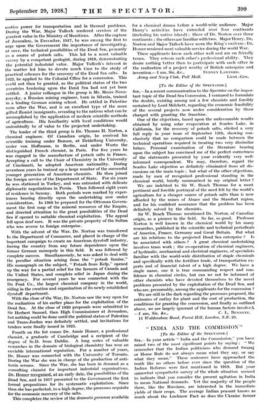[To the Editor of the SPECTATOR.] SIR,—In a recent communication
to the Spectator on the impor- tant topic of the Dead Sea Concession, I ventured to formulate the doubts, existing among not a few chemists and forcibly sustained by Lord Melchett, regarding the economic feasibility of the several projects now under consideration by those charged with granting the franchise.
One of the objections, based upon the unfavourable results obtained by using solar evaporation at Searles Lake, in California, for the recovery of potash salts, elicited a very full reply in your issue of September 15th, showing con- clusively that no comparison could be made between the technical operations required in treating two very dissimilar brines. Personal examination of the literature bearing upon the subject has convinced me of the perfect correctness of the statements presented by your evidently very well- informed correspondent. We may, therefore, regard the Searles Lake objection as definitely eliminated from all dis- cussions on the main topic ; but what of the other objections, made by men of recognized professional standing in the chemical world, briefly summarized in my original letter ?
We are indebted to Sir W. Beach Thomas for a most pertinent and forcible portrayal of the need felt by the world's agriculture for a cheaper source of potash salts than is now afforded by the mines of Alsace and the Stassfurt region, and for his confident assurance that the problem has been definitely solved by the chemists.
Sir W. Beach Thomas mentioned Dr. Norton, of Canadian origin, as a pioneer in the field. So far, so good. Professor Norton is well known in the chemical world by his many researches, published in the scientific and technical periodicals of America, France, Germany and Great Britain. But what are his relations to the projected Dead Sea enterprise ? Is he associated with others ? A great chemical undertaking involves team work ; the co-operation of chemical engineers, of hydraulic, mechanical and electrical engineers, of specialists familiar with the world-wide distribution of staple chemicals and specifically with the fertilizer trade, of transportation ex- perts and of financial talent of a high degree. We have a single name, one it is true commanding respect and con- fidence in chemical circles, but can we not be informed of other chemists who have devoted themselves to the novel problems presented by the exploitation of the Dead Sea, and who are, presumably, among the applicants for the concession ?
We are still in the dark regarding the processes proposed, the estimates of outlay for plant and the cost of production, the conditions for granting the concession, and finally as outlined above, we are largely ignorant of the human factors involved.
—I am, Sir, &c., C. L. BENNETT. 11 Waldenshaw Road, Forest Hill, London, S.E. 23.




































 Previous page
Previous page